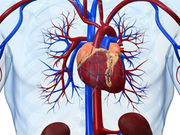However, successful percutaneous coronary intervention benefits all age groups
FRIDAY, Dec. 4, 2015 (HealthDay News) — Very old patients with ST-segment elevation myocardial infarction (STEMI) undergoing percutaneous coronary intervention (PCI) have increased rates of PCI failure, bleeding complications, and mortality, but successful PCI still benefits mortality risk across all age groups, according to a study published in the Dec. 15 issue of The American Journal of Cardiology.
Andreas Fach, M.D., from the Bremer Institut für Herz- und Kreislaufforschung at the Klinikum Links der Weser in Bremen, Germany, and colleagues examined clinical management and course of patients from the German Bremen STEMI Registry, divided into age groups: <75 years (4,108 participants), 75 to 85 years (1,032 participants), and >85 years (216 participants).
The researchers found that with increasing age, PCI failure was observed more often. Patients aged older than 85 years without successful PCI had higher in-hospital mortality, compared to those with PCI success (40.0 versus 18.1 percent; P < 0.05). Although patients aged 75 to 85 years and older than 85 years had a reduced rate of peri-interventional treatment with glycoprotein IIb/IIIa inhibitors, in-hospital bleeding occurred more frequently in these patients (P < 0.0001). With increasing age there were increased mortality rates during in-hospital and long-term course. In all age groups, successful PCI correlated with significantly lower in-hospital mortality, in multivariate analysis (odds ratio, 0.26), and with a trend toward lower one-year mortality.
“In conclusion, the present ‘real-world’ data demonstrate an elevated rate of PCI failure, bleeding complications, and mortality in elderly patients treated by primary PCI for STEMI,” the authors write. “However, a beneficial effect of successful PCI on mortality was observed in all age groups, even in very old patients, indicating the crucial role of revascularization therapy.”
Copyright © 2015 HealthDay. All rights reserved.








